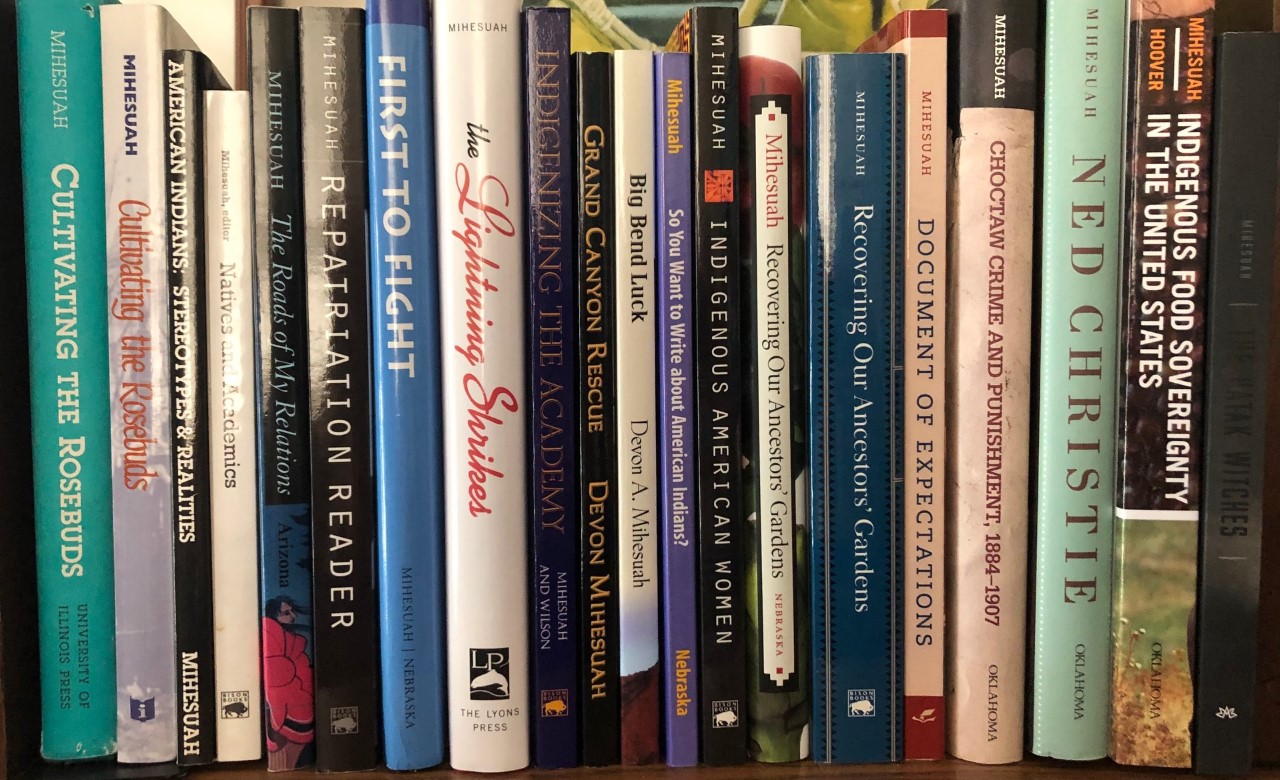In progress: biography of Solomon Hotema, the “Choctaw Witch Killer”
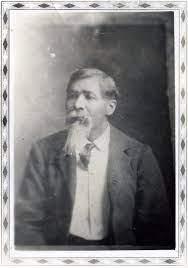
Indigenous Food Sovereignty in the United States: Restoring Cultural Knowledge, Protecting Environments, and Regaining Health Ed. with Elizabeth Hoover
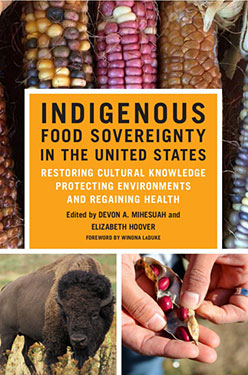
https://www.oupress.com/books/15107980/indigenous-food-sovereignty-in-the-united-sta
Daniel F. Austin Award presented by the Society for Economic Botany
Gourmand International’s World Cookbook Awards: Best in the World University Press Book
Gourmand International’s World Cookbook Awards: U.S. Best Book Award for Arctic
Gourmand International’s World Cookbook Awards: U.S. Best Heritage Book
High Country News’s “This Season’s Best Reads,” November 11, 2019
Literary Hub’s Best of University Press Books, 2019
EcoWatch’s Best Environmental Books of August, 2019
“Return and recovery is very much at the heart of this volume. Indigenous food sovereignty argues for rooted and collective continuance. More than about development and conservation—or resilience even—it is about sacredness and intimacy, health and sovereignty, food and identity; and it comes from a place deep within.”—Virginia D. Nazarea, author of Heirloom Seeds and Their Keepers: Marginality and Memory in the Conservation of Biological Diversity
“The collective wisdom of Turtle Island’s indigenous peoples offered in Indigenous Food Sovereignty charts a course for decolonization and liberation—and a vision for a better food system and a just society.”—Eric Holt-Giménez, author of A Foodie’s Guide to Capitalism
“This thoughtfully curated collection of essays gives food scholars a vital window on the gorgeous and fierce resilience of indigenous food systems and the activists who work to preserve them against steep odds. It will shape the way we think about indigenous food systems for years to come.”—Amy Trauger, author of We Want to Live: Making Political Space for Food Sovereignty.
“Indigenous Food Sovereignty in the United States is a detailed text that effectively conveys hope for the future of Indigenous communities while criticizing colonial practices—emphasizing that there are serious repercussions for abandoning tradition,and there is beneficial power in reclaiming Indigenous authority over food and environmental practices.”–Katie Wolf, Transmotion
“Gathering an impressive and wide-ranging list of contributors, and drawing on up-to-date and sophisticated scholarship in critical Indigenous studies and other interdisciplinary fields, Devon A. Mihesuah and Elizabeth Hoover demonstrate how food sovereignty unites Native patterns of kinship, livelihood, health, and cultural and ecological knowledge in ways that provide powerful alternatives to past models of political sovereignty imagined and compelled by the settler colonial state. Indigenous Food Sovereignty offers a guidebook to the significance of the rapid revitalization of Indigenous food movements in North America and beyond. Anyone interested in keeping pace with these transformations will benefit from reading this book.”–Michael Wise, Western Historical Quarterly
“This is a foundational book that we need to recognize and award.” —Economic Botany
Ned Christie: The Creation of an Outlaw and Cherokee Hero
Oklahoma Writer’s Federation Trophy Award for Best Non-Fiction Book
Finalist, Oklahoma Book Award
Best of the Rest Law and Order History-True West Magazine
“In contrast to the century-old popular, usually exaggerated story of outlawry in the Cherokee Nation, Devon Mihesuah presents an accurate historical account of Ned Christie. This book will be a refreshing read for those already familiar with Christie’s life, and all will find it an intriguing story well told.”–Daniel F. Littlefield, Jr.
Devon Mihesuah’s strengths in retelling the tale of Christie are her collaboration with his relatives, her archival prowess, and especially her ability to sift through the massive popular historiography that emerged around Christie’s story. Perhaps Mihesuah’s most impressive feat in this work is her unrelenting goal to sort out a confusing, error-ridden popular historiography… Ned Christie is a valuable, accessible addition to a growing historiography that explores an interwoven Indian Territory and Oklahoma. Both historians and those curious about the region, the Cherokee Nation, the North American West, indigenous peoples families, and memory in American history should consult her work. — John Truden, Western Historical Quarterly
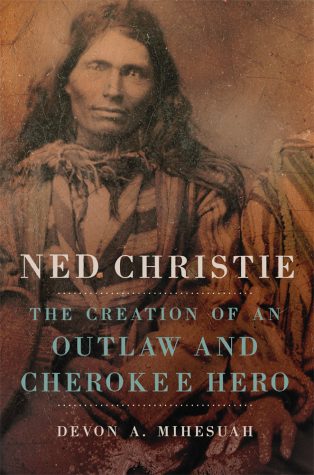
This excellent study is based on painstaking research. . . the study is thorough and the narrative quite readable, well suited for general and academic readers alike. Clearly this will remain the definitive work on Ned Christie for some time to come. — Kathleen P. Chamberlain, Southwestern Historical Quarterly
“Books like this are important today, when academic expertise is often dismissed and many would still prefer to read a story about “bad Indians” and “good white guys.” Mihesuah fights these preconceived notions with deep research and careful sourcing, writing in an accessible style that should appeal to nonprofessional readers. Her experience writing both fiction and nonfiction is especially helpful as she parses out where other authors have unwisely crossed the line between the two.”– Lauren Brand, Ethnohistory
Devon Abbott Mihesuah provides a nuanced, well-researched profile of the one-time Cherokee statesman accused of ambushing a Deputy U.S. Marshal in Indian Territory. Mihesuah demonstrates how outlaw myths evolve and how the journalistic wrongs done to Christie after his death matched the legal injustice done to him in life.–True West
“Mihesuah has written an intriguing and important book, in which she tracks Ned Christie’s life and legend. Like a master detective, she skillfully reexamines it all and exposes numerous fabrications, half-truths, and hearsays. Never losing sight of Christie and those associated with him – friends, kin, and enemies alike – her book exposes injustices, prejudices, and conflicts that have impacted Cherokee and Indigenous lives more broadly and that continue to resonate today. “— Native American and Indigenous Studies
“In Ned Christie, author Devon Mihesuah reveals the truth in the life of Cherokee hero Ned Christie and explains how he came to be that hero to generations of Cherokee people and others. Mihesuah’s dedication to research and thoughtful writing leave no doubt that her telling of Ned Christie’s story will last long into the future.” –Roy Hamilton, late historian for the Cherokee Nation
“Mihesuah connects Christie’s history to the challenges faced by other Native Americans in the southeastern Plains during the late nineteenth century, their struggles for sovereignty, white encroachment racism, and the persistent violence in that borderland region, which makes it a useful resource for historians of the Great Plains.”–Great Plains Quarterly
“This is fascinating reading about the Christie family genealogy, and life in the Cherokee Nation in the 19th Century.”– Talbot Library and Museum
“Mihesuah’s analysis is undoubtedly the most complete, unbiased and centered upon Christie to date. Mihesuah deftly balances fact-checking with drama, an engaging writing style, and a sense of intrigue in Ned Christie: The Creation of an Outlaw and Cherokee Hero. This work is sure to delight a wide variety of audiences, from casual readers to tribal historians, to historians of the West, the South, and the state of Oklahoma.”–Chronicles of Oklahoma
“An important historiographical statement on the study of so-called outlaws in the American West and a much-needed intervention vis-à-vis how scholars generally make sense of notorious historical figures. Consistently and convincingly, Mihesuah invites readers to compare the Christie of Wild West lore against a reinterpretation that situates him in a Cherokee context wherein outlaw becomes hero. The book thoroughly unmasks how previous writers merely repeated existing accounts of Christie’s life and sheds light on how these reiterations have often been misleading and occasionally completely fictional.”– Meg Devlin O’Sullivan, Journal of Southern History
“Highly recommended for readers interested in Native American Studies or the Old West.”–Library Journal
Choctaw Crime and Punishment, 1884-1907
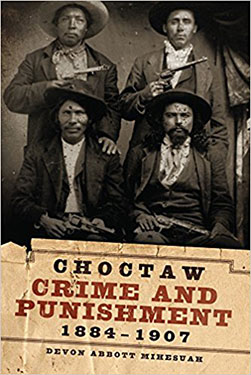
Best Book on Oklahoma History Award presented by the Oklahoma Historical Society
Oklahoma Writer’s Federation Trophy Award for Best Book of Non-Fiction
Finalist, Oklahoma Book Award
Talihina.org’s List of Incredible Books for World Book Day 2022.
“It is rare to find a book that examines political murders among American Indian tribes. In so doing, Choctaw Crime and Punishment adds a new dimension to our understanding of how and why the Choctaw political parties were so volatile and dangerous. Drawing on an astonishing array of documents, newspapers, letters, and court records, Devon Abbott Mihesuah offers a dramatic and highly readable narrative of this period in Choctaw history.”–Clare V. McKanna, author of White Justice in Arizona: Apache Murder Trials in the Nineteenth Century
“In this wonderfully researched manuscript, the author digs deeply into the political machinations within and around the Choctaw Nation in the 1880s and 1890s. Her book is a masterful work of historical investigation.”–Greg O’Brien, editor of Pre-Removal Choctaw History: Exploring New Paths
“In vivid and sometimes painful detail, Mihesuah reveals the depths of social and political turmoil in the Choctaw Nation in the late nineteenth century as leaders struggled with federal policies of land allotment and assimilation. This richly textured narrative conveys not only the facts but also the emotions of Choctaw citizens facing an uncertain future.”–Clara Sue Kidwell, author of The Choctaws in Oklahoma: From Tribe to Nation, 1855-1970
“Choctaw Crime and Punishment, 1884-1907 makes a valuable contribution to understanding intratribal dynamics during times of great stress. Likewise, the book’s extended discussion about unique methodological problems and appropriate sources should point the way for future studies of other tribes, especially those who were once forced from their southern homes into Indian Territory.”—Journal of Southern History
“Mihesuah expands what I had learned in interesting ways. More importantly, I had never before realized the extent to which violence pervaded the peaceful land where I grew up. Reading this book, I was enthralled and troubled.”–Me, You, and Books
Recovering Our Ancestors’ Gardens: Indigenous Recipes and Guide to Diet and Fitness
2005 Special Award of the Jury of the Gourmand World Cookbook Awards, and Finalist for Best in the World Cookbook
revised Edition: 2021 Gourmand World Cookbook Awards: Best in the World Food Culture Indigenous Foods book and Best in the U.S.A. Indigenous Book
NEW EDITION includes:
- Corrections, updated statistics, and new sources.
- Detailed case studies and appendixes to supplement the chapter themes.
- An expanded recipe section.
- A curriculum/resource guide for teachers, librarians, and those wanting to know more about Indigenous foodways, including objectives, resources, study questions for each chapter, assignments, and activities.
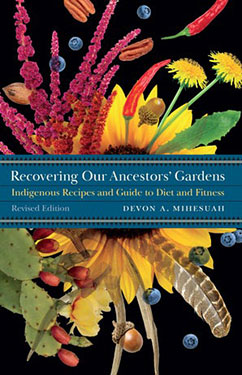
“The book brims with information. . . . This well-researched book will be most useful to launch discussions or perhaps to read chapter by chapter.”—Publishers Weekly
“The political goal of empowerment through dietary change is certainly worthy and most likely to be translated into action when generated from within by such a prominent member of a tribal nation as Devon Mihesuah.”—Linda Murray Berzok, Gastronomica
Recovering Our Ancestor’s Gardens: Indigenous Recipes and Guide to Diet and Fitness, benefits from both of her skills as a writer and historian which, in turn, could be very beneficial to readers seeking physical improvement. Much more than a simple cook book, Mihesuah asks indigenous readers, “How can we become healthy?” Whether interested in dieting or not, the book is fascinating. Win Awenen Nisitotung-Sault Ste. Marie Tribe of Chippewa Indians
So You Want to Write About American Indians? A Guide for Scholars, Students and Writers
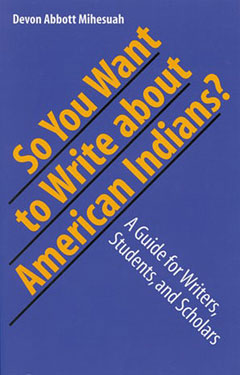
Wordcraft Circle of Native Writers’ Best Research Book of the Year
Finalist, Gustavus Myers Center for the Study of Bigotry and Human Rights
“For any writer this guide provides an invaluable overview of racism, cultural appropriation, stereotypes, ethics, and other do’s or don’ts. It covers the challenges and pitfalls of writing about American Indians. This book’s concise information and tips, which range from developing ideas to negotiating a book contract, make it a must-have for libraries and anyone writing a thesis, article, or book about American Indians.”–Tribal College: Journal of American Indian Higher Education
In creating this concise guide not only to the issues confronting anyone who wishes to write ethically about Native American issues, but also to the realities of getting work on the subject published, Mihesuah may have just genuinely advanced the cause of good scholarship in her field. More than any of the numerous introductions, it is to be hoped that this short text will become compulsory reading for newcomers in the field.”—Journal of American Studies
American Indigenous Women: Decolonization, Empowerment, Activism
Oklahoma Writers’ Federation Trophy Award for Best Non-Fiction Book
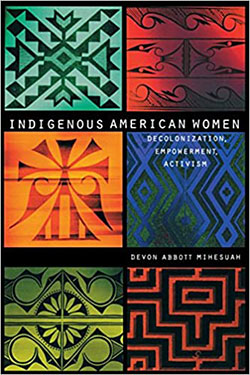
“A powerful book about the impact of colonization on the indigenous peoples of North America . . . These essays should be required reading in every research seminar . . .And they clearly establish Mihesuah as a leading indigenous intellectual.—Theda Perdue, Great Plains Quarterly
“As many of these issues relate to decolonization, the legacy of colonialism, and feminism, the essays speak to a larger audience than just American Indian women or people involved with American Indian Studies. Those whose work spans both activism and scholarship are likely to find something of interest between these covers. The book may also help those who have little experience with activist-scholarship such as Mihesuah’s work come to a better understanding of what she and others like her are trying to do.”—Journal of Colonialism and Colonial History
“Her observations on research and writing about Native women are valuable reminders to other scholars in the field.. scholars whose research deals with Native women will find Mihesuah’s “Indigenous American Women” a worthy resource.”
“Native and non-Native feminist scholars will find much to debate in this collection, which accomplishes its primary purposes–contributing to a growing body of scholarly literature by Indigenous women, confronting difficult topics frankly and directly, demonstrating ethical research, and providing catalysts for much-needed conversations about the complex nature of feminisms and activist agendas.”–Amanda J. Cobb (Chickasaw), New Mexico Historical Review
“Well worth reading to learn how a perceptive insider views the current state of Native affairs.”–Lillian Ackerman, Montana, The Magazine of Western History
“Particularly insightful, thought-provoking, and well-researched.”–Rodney Frey, Journal of American Ethnic History.
“Indigenous American Women is very highly recommended.”—The Midwest Book Review
“This book addresses many issues that cannot be easily summarized, but it is well worth reading to learn how a perceptive insider views the current state of Native affairs.”–Montana: The Magazine of Western History
Indigenizing the Academy. edited with Angela Cavender WIlson
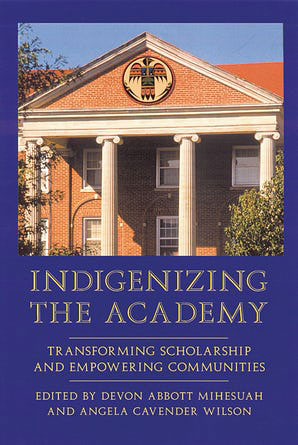
“The anthology demonstrates that courage is a good thing, calling the academy on its overexposure to Western rubrics and pointing out trails to a new, more Native, set of methods and theories.”—Choice
“A thought-provoking collection of articles by Native American scholars regarding the intellectual and psychological environments they encounter as students, university faculty, researchers, and authors.”—William G. Demmert Jr., Great Plains Quarterly
“The volume is certainly addressed to readers in the university community, but the authors refrain from academic jargon, making the book accessible to nonacademic audiences who might learn a great deal about contemporary Native American perspectives and issues.”—Ron Briley, Chronicles of Oklahoma
“Indigenizing the Academy emerges as a vibrant tool to revitalize stagnant intellectual and political activism. While Natives throughout the Americas celebrate the creation of a new museum in Washington, D.C., to honor the American Indian, these writers call for a new ethic focusing on honoring living knowledge. They claim this indigenous wisdom can subvert pretensions such as those of people who claim indigenous heritage in order to gain prestige. It also can make the academy responsive and responsible to First Nation people’s goals of self-determination and well-being.”–James Murray-White, Cultural Survival
Repatriation Reader
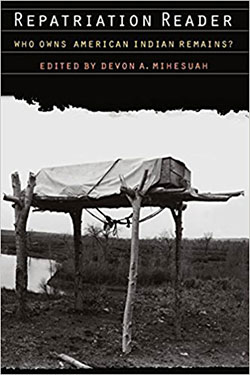
“In a well-rounded presentation, Mihesuah has assembled a suite of articles that address the historical, scientific, religious, and legal aspects of the repatriation issue . . .It offers a very well-rounded, thoughtful examination of the issue.”—North Dakota History
“[A] compact history of a complex and continuing debate.”—Museum Anthropology
“Devon Mihesuah has succeeded in assembling a useful overview of the repatriation issue that captures the diversity of views, the emotional intensity that has characterized the debate, and the legal and philosophical conundrums facing those who have struggled to form the law or who now work to implement the 1990 Native American Graves and Repatriation Act.”—Academic.oup
First to Fight: The Story of Henry Mihesuah
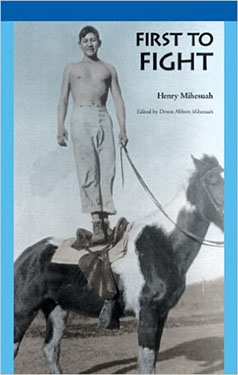
“A work readers of any level may engage and enjoy.”—Ty Hawkins, The Fulton Sun (MO)
“Forthright, down to earth, and representative of many aspects of Comanche culture and life in the mid to late twentieth century. Moreover, it demonstrates its subject’s tremendous personal and cultural pride, determination, and inner strength, qualities that have enabled many American Indians to navigate successfully their way through the seemingly endless legal, political, economic, educational, and racial obstacles they continue to face in their daily lives. In short, First to Fight is an important addition to the growing number of autobiographical works by Native writers.”—William C. Meadows, Great Plains Quarterly
“Mihesuah…belong[s] to a generation that can understand more accurately than any before or since what Native peoples lost, and gained, by becoming American.”—E. A. Schwartz, Western Historical Quarterly
“This is not a ‘tell all’ that exposes details of tribal life. Nor is it a bitter summary of past injustices. First to Fight is a straightforward account that should help readers understand what it means to be an Indian in modern America. Henry and this candid account of his life stand alone, without apology or embellishment.”—Glenn M. Busset, The Manhattan Mercury
“Professor Mihesuah deserves credit for her subtle editing that enables Henry Mihesuah to speak for himself. . . . First to Fight is a gem not only because of Henry Mihesuah’s stories and insights, but because it recasts the pattern of ‘life stories’ and ‘as told to’ biographies that have frustrated Native and non-Native scholars for years. This is one collaborative project that will appeal to a broad range of audiences and hopefully find its way into the classrooms, libraries, and bookshelves of readers across the country. ”—Jeffrey P. Shepherd, H-Net Reviews
Devon Abbott Mihesuah has done a service to all who would understand the full spectrum of the Native American experience of living in the 20th Century America as a minority people, surrounded by frequent misunderstandings and discrimination. Henry Mihesuah’s story . . . is a worthwhile anecdote to the all-too-pervasive statistical and sociological pronouncements about Comanches in particular, and other Native Americans, generally.—West Texas Historical Association Yearbook.
This slim, straightforward book is a fine case study in what it means to be Indian and American in the modern world.–Journal of American Ethnic History
The significance of Henry’s Mihesuah’s stories is often subtle and understated. What is quietly remarkable about Mihesuah’s life story are its intersections with broad historical changes in Native America and its testimony to the strength with which one can maintain an effectively bicultural identity despite the pressures of assimilation, racial prejudice and tribal politics. This book is not glamorous, but it is truthful . . .” –Southwestern American Literature
American Indians: Stereotypes and Realities
https://www.claritypress.com/product/american-indians-stereotypes-realities/
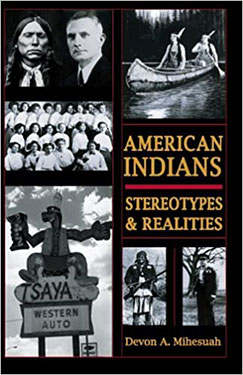
“Devon Mihesuah has provided precious insight into the racial identity and cultural struggles of American Indians as they strive to succeed in modern America. She has successfully challenged harmful stereotypes and racism in this significant book… If an accurate history is to be learned, then society must accept the truth of cultural pluralism and give equal and fair treatment to Native Americans and other minorities. This book is timely as a new wave of interest from the media and sports world mock Native Americans and continue to exploit our past. As an American Indian and a university scholar of history, I applaud Devon Mihesuah for successfully confronting the literature of false portrayal and negative images of Indian people.” Dr. Donald L. Fixico, Professor of History
“A good sourcebook for dispelling misconceptions and negative stereotypes about American Indians. These beliefs and attitudes exist and these statements are made in academic settings. It is fortunate that there are professors like Devon Mihesuah in classrooms to present the “other side,” perhaps only once in the lifetime of some students…” Dr. Karen Swisher
“A very useful book for clarifying many misbeliefs about Indians that Indians encounter from among the non-Indian population. Devon. Mihesuah demonstrates considerable understanding of contemporary myths and stereotypes about American Indians. This book will be a very useful reader for anyone truly trying to understand who American Indians really are. There is no other book on Indian images that provides the Indian “voice” that Devon maintains throughout the text.” Dr. Duane Champagne, Director
“Amusing and a helpful guide to general readers not that familiar with the national Indian community… The suggested readings are appropriate and the general style of presentation straightforward and accessible.” Dr. Terry P. Wilson
“Devon Mihesuah is one of the most gifted Native American scholars in the country today.” Robert A. Williams, Jr., Professor of Law University of Arizona, Tucson
“This is a small but important book which, like all important books, makes us uncomfortable because it makes us question our assumptions. It may make you squirm in your chair while you read it, but this book should be read by every educator andincluded in collections of every school and university library.”–Flagstaff Live!
“Professor Mihesuah goes beyond simply providing responses to common stereotypes. She provides the reader with assistance in efforts to improve understanding of her peoples. Each of the chapters provides solid information to challenge myths and stereotypes. Excellent photographs are interspersed throughout the book…. The implications of this book for social work practice are extensive… A valuable contribution”- Journal of Multicultural Social Work
Natives and Academics: Researching and Writing About American Indians.
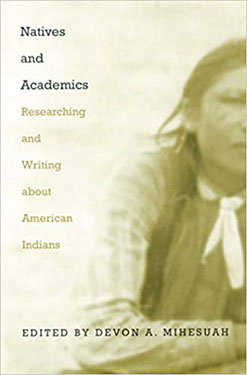
Critics’ Choice Award of the American Educational Studies Association
“The essays are spirited and refreshing in bringing out key issues concerning the study and the marketing of American Indian culture and history.”—Multicultural Review
“Provocative, clear, and forceful.”—Western Historical Quarterly
“The joy of this book is that Indians speak for themselves, and speak very well indeed!”—Book Talk: New Mexico Book League
Cultivating the Rosebuds: The Education of Women at the Cherokee Female Seminary, 1851-1909
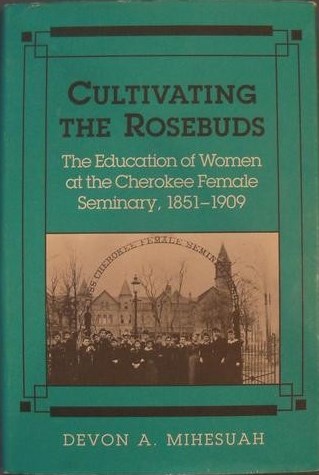
Critics’ Choice Award of the American Educational Studies Association
“I recommend it to any serious student of the Cherokee people.” — Robert J. Conley, author of Mountain Windsong
“Of the many books about Cherokee history, few deal with the issue of acculturation in the post-removal period and none so effectively as Devon Mihesuah’s Cultivating the Rosebuds.” — Nancy Shoemaker, Western Historical Quarterly
“[An] important work. . . . It tells the fascinating and occasionally poignant story of the Cherokee Female Seminary, which enrolled its first class of ‘Rosebuds,’ as the seminarians called themselves, in 1851.” — Choice
“Required reading for anyone remotely interested in the history of Native American education.” — David W. Adams, History of Education Quarterly
“In this thoroughly researched and genuinely thoughtful study, Devon Mhesuah tells the story of the Cherokee Female Seminary, a remarkable institution . . . required reading for anyone remotely interested in the history of Native American education. Particularly fascinating is Mihesuah’s analysis of how CFS relflected the deep racial, cultural, and class divisions of Cherokee society. . . [a] gem of a book.”—History of Education Quarterly
“Cultivating the Rosebuds is an extraordinarily intriguing case study of the critical role played by formal education in shaping identity. Devon Mihesuah has recreated the school’s ethos in captivating fashion.”—Historical Studies in Education
“Cultivating the Rosebuds is a well-researched, beautifully written, and nuanced account of the Cherokee Female Seminary which provides a microcosmic view of the Cherokee Nation’s struggle to survive the loss of their land through removal and allotment and to provide and education for the ‘talented tenth.’”—Journal of Women’s History
“Mihesuah . . .has produced a fascinating case study that reveals in microcosm the intricacies of intersecting dimension of difference with one tribal group . . .I strongly recommend this work to anyone interested in the multicultural history of women’s education.”—Helen Bannon, Center for Research on Women, Memphis State University
